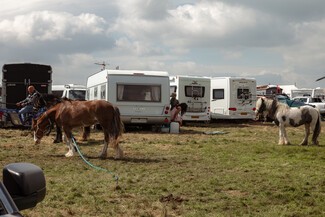Travellers disproportionately jailed for breaching council planning injunctions - say researchers

Gypsies and Travellers who are sentenced to imprisonment for breaching civil injunctions imposed by councils during planning disputes, are far more likely to go to prison for longer, than people sentenced for breaching anti-social behaviour or protest injunctions – researchers have revealed in a wide-ranging review of sentencing in the civil courts.
Research by academics at the universities of York and Coventry found that people were imprisoned for an average of 95 days for breaches, with Gypsy and Traveller cases disproportionately more likely to receive a higher sentence and less likely to have it suspended than people who breach other types of injunctions imposed by the civil courts.
“Turning to the different types of injunctions, we are concerned by the higher sentencing for Gypsy and Traveller injunctions compared to other injunctions,” report the researchers.
“Of course, in protest cases, there are the Article 10 and 11 issues that might soften sentences. But for Gypsies and Travellers, there are Article 8 issues to consider too,” they add.
“So why are the sentences higher than other types of injunctions? There is evidence of both harsher policing of Gypsies and Travellers and higher rates of incarceration.”
The data the researcher studied is based on decisions that are made available on the Ministry of Justice Judicial Website of judgments. The Civil Procedure Rules require decisions to commit to prison to be published on the website, but, say the researchers, there is evidence this this does not always happen, and many civil court injunction cases involving incarceration may have been missed.
The researchers created a spreadsheet of cases from 1 January 2020 to 31 December 2022 where the recorded outcome of the civil court case was a sentence of imprisonment, whether immediate or suspended. The total number of cases was 263. 10 of those cases were Gypsy and Traveller planning dispute injunctions, with most of the others being concerned with anti-social behaviour and protest.
Five of the recorded Gypsy and Traveller cases that ended in imprisonment involved five Travellers who broke injunctions imposed by the council at a single Traveller site in Essex – on land that the Travellers owned. The five Travellers were sentenced to imprisonment in December 202, the highest sentence being 14 months, and a mother of six dependent children was also sentenced for 14 weeks.
By way of comparison, say the researchers, in a recent criminal case, Luton Crown Court imposed a sentence of 14 months in prison on a man who admitted causing death by careless driving and causing death while uninsured or unlicensed.
Under the criminal law, being a ‘sole or primary carer for dependent relatives’ is a statutory factor that can reduce a sentence. That allows the court at least to consider the position of children and other dependants when sentencing. In the civil law, which is where breach of injunctions are tried and sentenced, there is no requirement to take account of a significant harmful impact on others.
“There has been very little written about the use of injunctions and particularly how they lead to imprisonment,” conclude the researcher.
“In the first detailed interrogation of this issue, analysis of our database of 263 committal for contempt decisions demonstrates the wide range of penalties applied, the (far) higher sentencing imposed in Gypsy and Traveller cases and the uneven nature of legal representation. The courts are sentencing, but without the full range of sentencing options, without some of the usual procedures in criminal courts, and with minimal guidance."
"Our data suggests that committal proceedings for breach of an injunction are yet another example of discrimination against (Gypsies and Travellers.”
TT News
(Stock photograph: Appleby 2024 by Eszter Halasi)